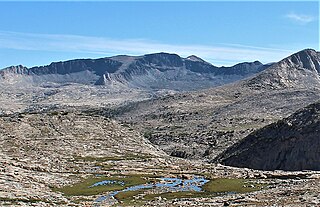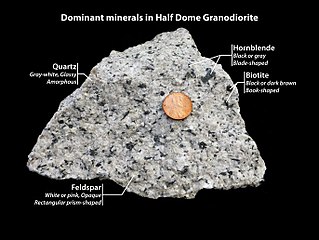
A batholith is a large mass of intrusive igneous rock, larger than 100 km2 (40 sq mi) in area, that forms from cooled magma deep in Earth's crust. Batholiths are almost always made mostly of felsic or intermediate rock types, such as granite, quartz monzonite, or diorite.

The exposed geology of the Yosemite area includes primarily granitic rocks with some older metamorphic rock. The first rocks were laid down in Precambrian times, when the area around Yosemite National Park was on the edge of a very young North American continent. The sediment that formed the area first settled in the waters of a shallow sea, and compressive forces from a subduction zone in the mid-Paleozoic fused the seabed rocks and sediments, appending them to the continent. Heat generated from the subduction created island arcs of volcanoes that were also thrust into the area of the park. In time, the igneous and sedimentary rocks of the area were later heavily metamorphosed.

Cathedral Peak is part of the Cathedral Range, a mountain range in the south-central portion of Yosemite National Park in eastern Mariposa and Tuolumne Counties. The range is an offshoot of the Sierra Nevada. The peak which lends its name to the range derives its name from its cathedral-shaped peak, which was formed by glacial activity: the peak remained uneroded above the glaciers in the Pleistocene.

The Sierra Nevada Batholith is a large batholith which forms the core of the Sierra Nevada mountain range in California, exposed at the surface as granite.

Yosemite National Park is located in the central Sierra Nevada of California. Three wilderness areas are adjacent to Yosemite: the Ansel Adams Wilderness to the southeast, the Hoover Wilderness to the northeast, and the Emigrant Wilderness to the north.

The Cathedral Peak Granodiorite (CPG) was named after its type locality, Cathedral Peak in Yosemite National Park, California. The granodiorite forms part of the Tuolumne Intrusive Suite, one of the four major intrusive suites within the Sierra Nevada. It has been assigned radiometric ages between 88 and 87 million years and therefore reached its cooling stage in the Coniacian.

Kuna Peak is a summit on the boundary between Mono and Tuolumne counties, in the United States, is the highest point on Kuna Crest. With an elevation of 13,008 feet (3,965 m), Kuna Peak is the 146th-highest summit in the state of California, and is the third-highest mountain in Yosemite National Park.

Half Dome Granodiorite is granodiorite found in a region on and near Half Dome, in Yosemite National Park, California, United States. The granodiorite forms part of the Tuolumne Intrusive Suite, one of the four major intrusive suites within the Sierra Nevada.

El Capitan Granite is a type of granite, in a large area near El Capitan, in Yosemite National Park, California, United States. The granite forms part of the Tuolumne Intrusive Suite, one of the four major intrusive suites within the Sierra Nevada.

Kuna Crest Granodiorite, is found, in Yosemite National Park, United States. The granodiorite forms part of the Tuolumne Intrusive Suite, one of the four major intrusive suites within the Sierra Nevada. Of the Tuolumne Intrusive Suite, it is the oldest and darkest rock.

Sentinel granodiorite is a type of granodiorite found in Yosemite National Park. It is a poorly understood western "outlier" of the ~93-85-Ma Tuolumne Intrusive Suite of the Sierra Nevada batholith. It is only slightly older than the undated Yosemite Creek Granodiorite and the Kuna Crest Granodiorite.

The Tuolumne Intrusive Suite is the youngest and most extensive of the intrusive suites of Yosemite National Park, and also comprises about 1/3 of the park's area. The Suite includes Half Dome Granodiorite, Cathedral Peak Granite, and Kuna Crest Granodiorite.

The Intrusive Suite of Buena Vista Crest is an intrusive suite which extends 30 kilometres (19 mi) southward, from Yosemite Valley to Yosemite National Park's southeastern boundary, into plutons of the Sierra Nevada Batholith, which are slightly older. These intrusive suites also include
- Fine Gold Intrusive Suite
- Intrusive Suite of Jack Main Canyon
- Intrusive Suite of Merced Peak
- Intrusive Suite of Sonora Pass
- Intrusive Suite of Yosemite Valley
- Tuolumne Intrusive Suite

Johnson Peak is the highest mountain, in Tuolumne Meadows, Yosemite National Park.

Hiking, rock climbing, and mountain climbing around Tuolumne Meadows in Yosemite National Park has many options.

Kuna Crest is a mountain range near Tuolumne Meadows, in Yosemite National Park, California.

Virginia Peak is a mountain summit in the northern part of Yosemite National Park, north of Tuolumne Meadows. It is the 25th-highest mountain in Yosemite National Park.

Gaylor Peak is an 11,004-foot-elevation (3,354 meter) mountain summit located on the crest of the Sierra Nevada mountain range in northern California, United States. The peak is situated on the common boundary shared by Yosemite National Park with Inyo National Forest, as well as the border shared by Mono County with Tuolumne County. It rises immediately above the park's Tioga Pass entrance station and Tioga Lake. Topographic relief is significant as the summit rises approximately 1,400 feet above the lake in one-half mile (0.80 km). The peak is a popular hiking destination on summer weekends due to easy access via the two-mile Gaylor Lakes Trail from State Route 120 which traverses the east base of the peak.
Johnson Granite Porphyry is found in Tuolumne Meadows, Yosemite National Park.















